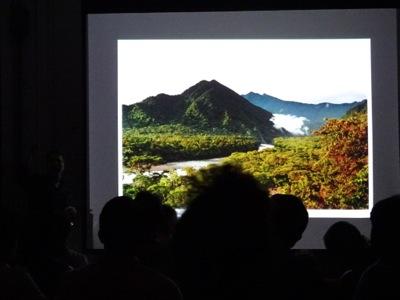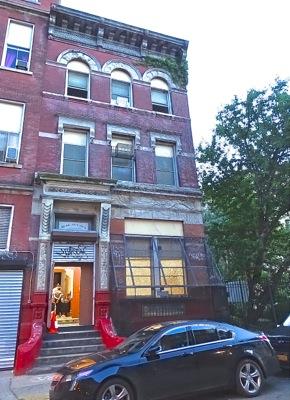doc film center bronx doc film center melrose neighborhood bronx documentary film center near the hub in melrose history architecture bronx
Doc Film Center in the Bronx
Film Based Cultural Center Attracts Eclectic Group for presentation of Carlos Villalon's Coca: The Lost War on Drugs
 September 24, 2018 / Melrose Neighborhood Bronx / Arts & Film in the Bronx / Bronx Buzz NYC.
September 24, 2018 / Melrose Neighborhood Bronx / Arts & Film in the Bronx / Bronx Buzz NYC.
In July I visited the Doc Film Center in the Bronx to attend a new film by Carlos Villalon about the failed war on drugs. I arrived as it was getting dark, disembarking from the #5 train at the HUB at 3rd Avenue, 149th Street and Willis in the neighborhood of Melrose. I walked north a couple of blocks and took a left, coming upon the Doc Film Center which is housed in a three story building that looks to be in the neighborhood of a century old.
The HUB at 3rd Avenue, 149th Street and Willis / Melrose Avenue intersection was once referred to as the Times Square of the Bronx. It is still a fairly robust shopping district during the daytime, but after hours when the stores close, it has a sort of abandoned feel. I went in knowing that the crime rate in the Bronx, like the rest of the city, is down significantly versus prior years.
In the past five years, according to the Bronx Borough President Ruben Diaz, the murder rate for the entire Bronx has been below 100. This is in a borough that is home to 1.471 million, so the murder rate is below 1 murder for every 14,710 people in the Bronx. It's worth adding that a third of Bronx murders are from gang related violence, which sometimes includes collateral damage.
Architecture Near the Hub in Melrose: 1900 - 1930
 The NYPD has been having some good success in taking down gangs in Bronx as well as NYC. In March of 2016, they reportedly completed the biggest bust in the Bronx, capturing 89 gang members. There are numerous places in Manhattan and Brooklyn that are far more dangerous, but Bronx historically has been given the worst reputational rap, and that impression, while changing, still lingers. I attribute it to LOCAL TV NEWS COVERAGE, which seems to PRIMARILY report crime stories when covering the Bronx.
The NYPD has been having some good success in taking down gangs in Bronx as well as NYC. In March of 2016, they reportedly completed the biggest bust in the Bronx, capturing 89 gang members. There are numerous places in Manhattan and Brooklyn that are far more dangerous, but Bronx historically has been given the worst reputational rap, and that impression, while changing, still lingers. I attribute it to LOCAL TV NEWS COVERAGE, which seems to PRIMARILY report crime stories when covering the Bronx.
As I walked to the Doc Film Center I observed the architecture around which I found myself surrounded. The Hub heyday was back in the early 1900's running into the 1930's when the Great Depression hit. Thus many of the buildings in the area are from that time period, which to me, is what I've come to think of as New York classical architecture and building. They made them quite well back then, as America was flexing its economic strength.
Inside the Doc Film Center I walked along the wooden floors to a large room with incredibly high ceilings, like what you would expect to find in a high school gym. There were chairs lined up looking toward the front of the building where the speaker had already begun his presentation.
What followed was a journey into the drug wars. As Carlos Villalon took us on a journey through the South American jungles, into Coca: The Lost War on Drugs ...
- CLICK here later today to view the rest of our report about the Doc Film Center in the Bronx neighborhood of Melrose and the photographic documentary Coca: The War on Drugs by Carlos Villalon.
Doc Film Center in the Bronx
Film Based Cultural Center Attracts Eclectic Group for presentation of Carlos Villalon's Coca: The Lost War on Drugs
 September 24, 2018 / Melrose Neighborhood Bronx / Arts & Film in the Bronx / Bronx Buzz NYC. Continued.
September 24, 2018 / Melrose Neighborhood Bronx / Arts & Film in the Bronx / Bronx Buzz NYC. Continued.
Carlos Villalon is a photographer who was born in Chile in 1965, where he studied graphic design. Around the turn of the millennium, Carlos moved to New York City where he studied photography at the Parson School, before landing a short gig with Getty Images. After Getty he worked for Redux Pictures [2003] before going out on his own.
Over the past 15 plus years, Carlos has focused much of his photo art / journalism on capturing life in Latin America. He has been published in national magazines like Newsweek, National Geographic and Nature Conservancy. In 2010 he won the second place award in the World Press Photo contest for his work on the Medellin Gangs in Colombia.
Carlos is in the process of publishing a new book about Coca: The Lost War on Drugs. His goal is to raise awareness of how the Nixonian War on Drugs, which he says had politically motivated origins, has ruined and cost the lives of millions and thousands, respectively.
He took us through a beautiful photographic slide show - presented on a movie-sized screen - which was as titillating as informative. Carlos started the show by identifying the cultural significance of the coca leaf in the Latin American cultures of Colombia, Peru and Bolivia - the latter two of which were part of the Incan Empire. The Inca Empire is a civilization, which originated thousands of years ago, which ended with the Spanish conquest of Latin America in the 16th century [1500's].
Coca was originally believed to have god-like qualities, and only the upper class in the Incan Empire were allowed to consume it. After the Spanish destroyed the empire, the old cultural laws were changed and anyone could use it. Coca was used to ease some of the pain and misery brought about by the Spanish conquistadors.
Thus, from the mid / late 1500's to modern times, coca use became a part of life for many of the people living in these countries, including Colombia, which is where quite a bit of Carlos Villalon's story is told.
Carlos told us that the war on drugs started in the early 1970's, during the anti-war demonstrations of Vietnam. He said that President Richard Nixon seized upon using drug laws to stamp down the protesters, as many of the protesters were college students, and many of them used drugs, including cocaine. Carlos opined that the anti-drug laws were a means by which Nixon could incarcerate the loudest voices.
After taking us through rural life, where the coca leaves are grown, Carlos took us into Bogata, where the labs take the coca leaf and transform it into cocaine. The value of the product rises significantly, because it is at that point - if I understood him correctly - that the product becomes illegal.
And once the coca becomes illegal and highly valuable, guns, murders, gangs and turf wars arise, bringing collateral damage in their stride. Prostitution, drugs, gambling and guns were then added to the culture, bringing death, sorrow, fear and intimidation in with them.
Carlos finished by bringing the product and attendant drug related culture home to the Bronx - including its attendant social and law enforcement problems.
After the show I met Doc Film Center Founder, Michael Kamber. Michael has been a photographer and journalist for most of his adult life. According to the Doc Film Center website, Michael worked for the New York Times between 2002 and 2012, covering many of the world hot spots including conflicts in Iraq, Afghanistan, Liberia, Sudan, Somalia, Congo, and other countries.
In 2011 Kamber founded the Bronx Doc Film Center as a resource to contribute to positive change using film and photography. And Kamber is an adjunct professor at Columbia University. The website finishes Michael Kamber's bio with the following list of awards.
"He is the winner of a World Press Photo award, the Mike Berger Award, the Society of Professional Journalists Deadline Club Award, American Photo Images of the
Year, and is a member of The New York Times team that won a 2003 Overseas Press
Club award. The New York Times twice nominated Kamber's work for the Pulitzer
Prize."
Kamber gave me a brief history about the Doc Film Center, noting that they had just moved to this building about a year ago. He said the Doc Film Center has a friendly relationship with the adjacent Immaculate Conception Church and school. Some of the programs and exhibits the Doc Film Center organizes and hosts spill into the adjacent Immaculate Conception space, which I saw while I was there.
Kamber said that the Doc Film Center hosts educational programs, exhibits, workshops and other events, including a Latin program. The website notes that over 25,000 people have visited the Doc Film Center since it opened and that 70% of them are from the Bronx.
I walked around the facility, into the enclosed courtyard, and into the adjacent buildings of Immaculate Conception school and church were there was a photo exhibit on display. There were images being projected on one of the courtyard walls, as well as a few hanging ones.
As I made my out, I looked into the front exhibit room where there was an exhibit by famed Puerto Rican photographer Jack Delano, of whom my sister had often spoke fondly while living in Puerto Rico. This was one of my motivations for visiting the Doc Film Center on this particular night.
The Doc Film Center hosts screenings, exhibits, talks and other programs throughout the year, many of which we include in our weekly Weekend Things To Do post. It's well worth at least one visit - and for those interested in photography, film and social change - likely many, many more.
The Doc Film Center - Melrose Neighborhood - Bronx News
The Doc Film Center Melrose Neighborhood History & Bronx News & Related Info
Click this link for promotions, discounts and coupons in the Bronx.
Click these links for promotions by advertisers in the Bronx.
Click this link to go to the Bronx Neighborhoods section.
Site Search Tips. 1) For best results, when typing in more than one word, use quotation marks - eg "Midtown Neighborhood". 2) Also try either singular or plural words when searching for a specific item such as "gym" or "gyms".
$element(bwcore,insert_search,N)$
Click the log in link below to create an ID and post an opinion.
Or send this story to a friend by filling in the appropriate box below.
Click this link to the Bronx Buzz front page.
Bronx NYC Related Links
Click for Bronx Restaurants - Bronx NYC.
Click for Bronx Banks Loans & Mortgages - Bronx NYC.
Click for Bronx Shopping - Bronx NYC.
Click for Bronx Things To Do Bronx NYC.
Click for Bronx Neighborhoods - Bronx NYC.
Click for Bronx Real Estate & Business - Bronx NYC.
Click for Bronx Schools & Bronx Public Education NYC.
Click for Bronx Street Fairs NYC.
Click for Bronx Politics & Government NYC.
Click for Bronx Farmers Markets NYC.
Click for Bronx Arts & Culture
$element(adman,groupads,Sectional2 Ad)$

















